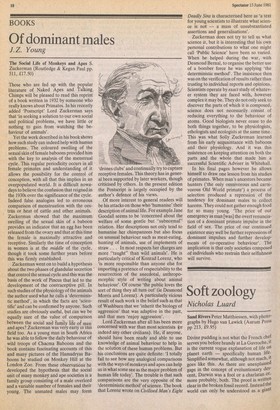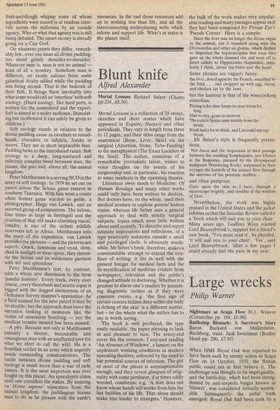Soft zoology
Nicholas Luard
Sand Rivers Peter Matthiessen, with photographs by Hugo van Lawick (Aurum Press pp 213, £9.95) Divine pudding is not what the French chef serves you before brandy at La Gavroche, it is the current vogue explanation of life on planet earth — specifically human life.. Simplified somewhat, although not much, if goes like this. As there are unexplained gaps in the concept of evoluntionary descent, Darwin was a fool or a charlatan or, more probably, both. The proof is written clear in the broken fossil record. Instead the world can only be understood as a giant fruit-and-dough whipup some of whose ingredients were tossed in at random intervals across the millennia by an outside agency. Who or what that agency was is still being debated. The smart money is already going on a Can God.
On whatever points they differ, remarkably few, over one issue all divine puddingites stand grimly shoulder-to-shoulder. Whatever man is, man is not an animal — least of all a monkey. Somehow man is different, an exotic sultana from some galactical Araby added while the pudding was being stirred. That is the bedrock of their fath. It brings them inevitably into what some would call an 'interface' with soft zoology. (Hard zoology, like hard porn, is written for the committed and the expert. Soft is aimed at a wider audience. Stimulating but inoffensive it can safely be given to children.) Soft zoology stands in relation to the divine pudding cause as cavaliers to roundheads, crusaders to infidels, franks to moors. They are in short implacable foes. Pudding hews to the introduced raisin. Soft zoology to a deep, long-nurtured and infinitely complex bond between man, the planet, the past and, above all, the animal kingdom.
Peter Matthiessen is a serving NCO in the army of soft zoology. In 1979 he set out on patrol across the Selous game reserve in southern Tanzania. With him went a crusty white former game warden as guide, a photographer, Hugo van Lawick, and an assorted group of companions. The Selous, four times as large as Serengeti and the ,creation of that old snake-charming rascal, Ionides, is one of the richest wildlife reservoirs left in Africa. Matthiessen tells the story of the expedition, van Lawick provides the pictures— and the pictures are superb. Quick, luminous and vivid, drenched in sunlight or river-spray, they chronicle the Selous and its wilderness garrison 'with wit and splendour.
Peter Matthiessen's text, by contrast, adds a whole new dimension to the term 'painful honesty'. Every track, every river course, every thornbush and acacia copse is logged with the dogged earnestness of an Ordnance Survey mapper's apprentice. As a field manual for the next patrol it may be invaluable, but the approach does leave the narrative looking at moments like the victim of saturation bombing — not the smallest termite mound has been missed.
A pity. Because not only is Matthiessen patently a decent, honourable and courageous man with an unaffected love for what we elect to call the wild. He is a frontline soldier in an army which urgently needs outstanding communicators. The battle between divine pudding and soft zoology is much more than a war of rude names. It is the most important was ever fought on this planet. An apocalyptic claim until one considers the stakes, By insisting on Homo sapiens' separation from the animal kingdom, the puddingites license man to do as he pleases with the earth's resources. In the end those resources add up to nothing less than life, and all the interconnecting underpinning webs which inform and support life. What's at stake is the planet itself.







































 Previous page
Previous page